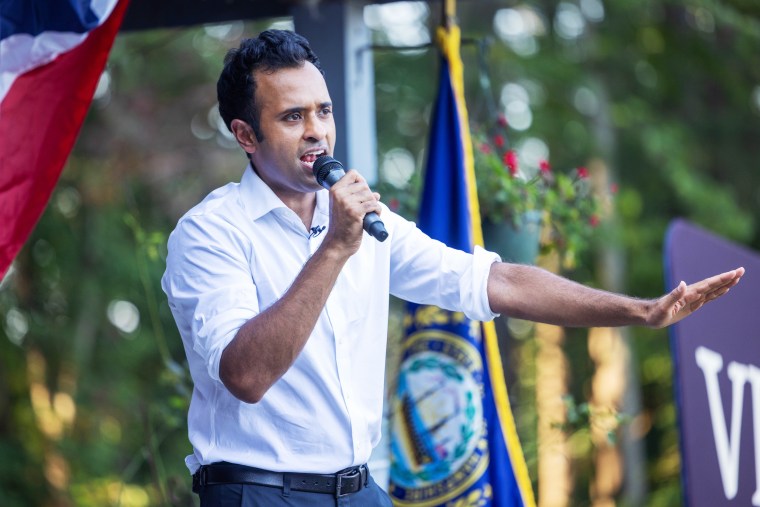In a Republican presidential primary where many of the candidates are seeking to appear the toughest on U.S. policy toward China, businessman and self-described “anti-woke” crusader Vivek Ramaswamy has portrayed himself as the toughest of them all.
And unlike the others, he has said this has come at a personal price: He is now prevented from entering the country.
In March, the Team Vivek War Room account tweeted that the candidate “personally cannot travel in China because of the tough positions he publicly adopted.”
“There may be a lot of our MAGA friends that do not WANT to go to China by choice, but he literally can’t travel to China,” the tweet read.
And at a campaign event on June 25 in Durham, New Hampshire, Ramaswamy took a question from Granite State GOP congressional candidate and Chinese dissident Lily Tang Williams, who asked if the presidential candidate was, as she said she was, “banned” from entering China.
“I can’t travel to China,” Ramaswamy said, later adding, “We’re in the same club.”
After the event, Williams tweeted: “Vivek & I both are on the [Chinese Communist Party's] Blacklist, we are doing something right.”
Williams’ sentiment gets at how such a blacklisting could be beneficial to Ramaswamy politically. He’d stand as seemingly the only GOP primary contender barred from entering China in a primary where his rivals are vying to be seen as the most formidable opponent to Beijing.
But when asked about the suggestion Ramaswamy was formally barred, Tricia McLaughlin, Ramaswamy’s communications director, dialed back what the candidate has said. She said he “has received counsel that he should not travel to China based on his public criticism of the regime.”
That was not the impression Williams, who first met Ramaswamy in February, was left with. After connecting with him then, Williams, who has described herself as a “Survivor of Mao’s Cultural Revolution,” tweeted that they had “something in common --- both of us are on the Blacklist, not allowed to visit China because we speak the truth and won’t be silenced. I hope someday I can see my family again.” She posted a similar message late last month, just prior to the first presidential debate in Milwaukee.
Reached by NBC News, Williams said when the two first connected, “there were no details from his blacklist case.”
“He only told me that after I told him that I was threatened on social media by CCP trolls,” she said. “I had to cancel my trip to China to visit family and friends in 2019.”
Post-Covid, U.S. positioning on China has become one of the top foreign policy issues among members of both parties as tensions between the two countries have simmered, particularly over China’s handling of the Covid-19 outbreak and after the U.S. earlier this year shot down a Chinese spy balloon that entered American airspace.
In this environment, Ramaswamy launched his campaign by calling China “the greatest external threat to America” and has called for the U.S. to declare its economic “independence” from the country. Recently, he has tussled with rivals over his plan to defend Taiwan from Chinese aggression until the U.S. no longer needs to rely on the island for semiconductor production, which would trigger a return to long-standing “strategic ambiguity” on China and Taiwan.
Yet Ramaswamy’s views on China mark a shift from his earlier business career. The former biotech executive’s company, Roivant Sciences, expanded into the Chinese market in 2018. That same year, Ramaswamy appeared in Shanghai for a pharmaceutical conference.
In a post on his campaign website, Ramaswamy’s team said that while it is true the candidate did business in China, the company “eventually wound down its operations there as the risks became apparent over time,” doing so before Ramaswamy’s presidential run.
“Vivek understands the threat posed by China more deeply than nearly any other politician in America,” his campaign wrote.
China has barred a number of prominent Americans and government officials from entering the country, like it did following the end of President Donald Trump’s administration when it announced that former Secretary of State Mike Pompeo, former national security adviser Robert O’Brien and former U.S. Ambassador to the United Nations Kelly Craft were barred from entering the country. (It also announced that former Trump aides, including Peter Navarro and Steve Bannon, were placed on the blacklist.)
“We have not heard that he is not allowed to visit China,” Chinese Embassy spokesperson Liu Pengyu told NBC News when asked about Ramaswamy. “The Chinese government has always supported the people-to-people exchanges between the two countries.”
Brett Bruen, who served as director of global engagement in President Barack Obama’s administration, said it would be highly unusual for someone of Ramaswamy’s stature to be barred from entering China without the government releasing a statement to announce the ban.
“So unless there is a statement — unlikely,” he said, adding, “With those political types, they are normally announced.”

